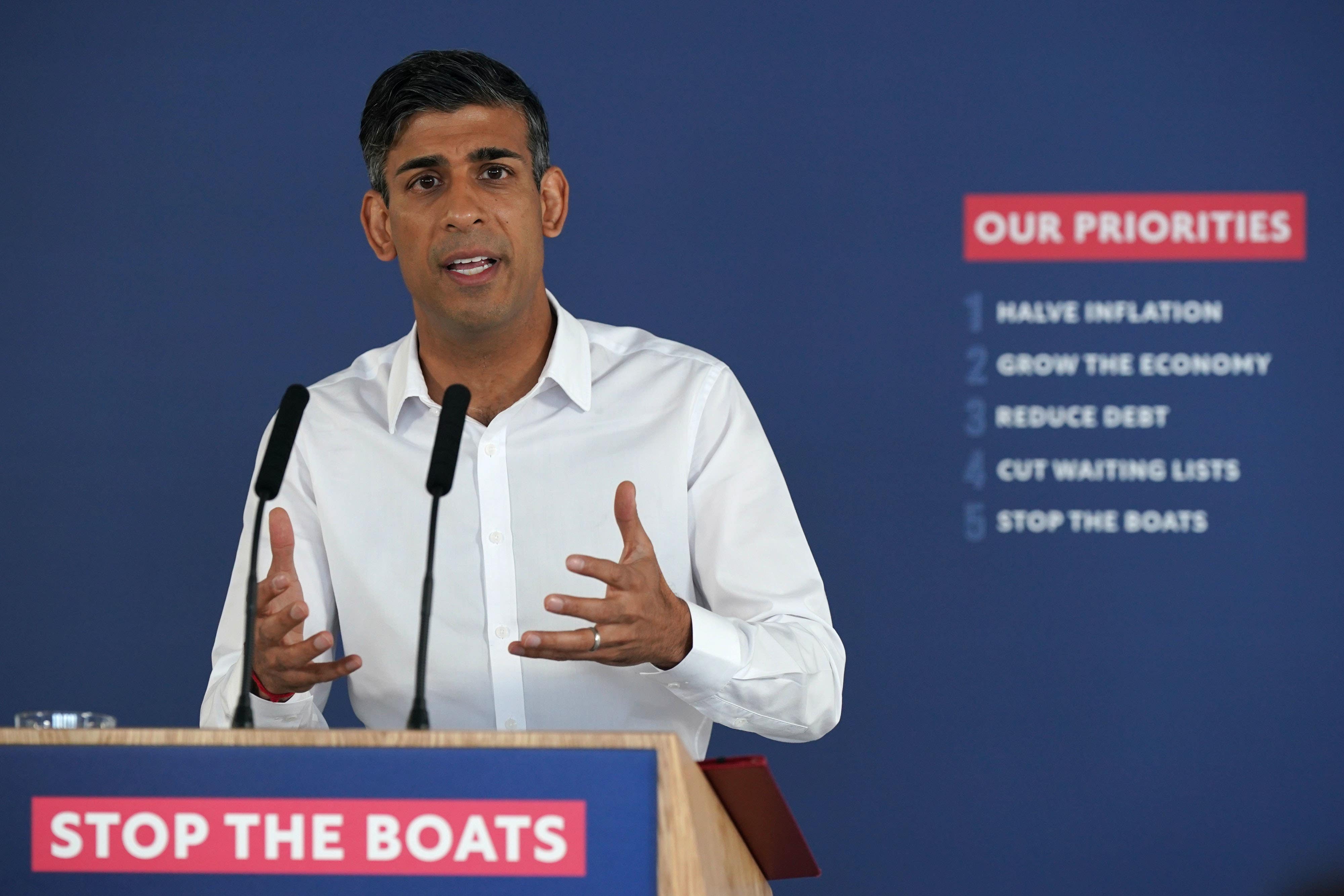Don’t start a victory lap yet, Keir, you’ve got problems of your own
Yes, another of Rishi Sunak’s five pledges looks set to be broken, writes John Rentoul, but his money trouble may soon become Starmer’s problem. And when it comes to reducing debt, neither party is being straight with voters


It seemed like a good idea at the time. Rishi Sunak, a new prime minister taking over after his party had made an absolute hash of getting rid of Boris Johnson, sought to focus attention on basic competence in delivering the people’s priorities.
So he made five New-Labour-style promises on 4 January, so that people could decide by the end of the year that he had done a good job, and he could go into the election year with confidence.
It hasn’t worked out like that. This morning’s public finance figures from the Office for National Statistics suggest that the chances of fulfilling the third promise, “reduce debt”, are a toss-up.
Jeremy Hunt, the chancellor, has put out a statement reminding us that the independent Office for Budget Responsibility predicted that the national debt would be falling as a share of national income in 2027-28, “with headroom of £6.5bn”.
Not only does Sunak’s debt pledge come with a five-year deadline, when the tenor of his five promises was that they were “his five key priorities for 2023” as the government website puts it, but it seems likely to be missed.
A margin of £6.5bn in five years’ time is insignificantly different from zero. And the problem with today’s borrowing figures is that, although they look better than expected, they store up trouble for the future. As Chris Giles of the Financial Times explained, inflation boosts tax receipts in the short term, “but it also makes future cash spending plans less credible”.
So the debt promise is likely to be broken, even if we allow the prime minister a generous interpretation of his deadline. The first pledge, to halve inflation, hangs in the balance – most forecasters expect it to be met by only the narrowest of margins. The second pledge, to grow the economy, looks anaemic, with real growth expected to be 0.3 or 0.4 per cent this year. And the last two promises, to cut NHS waiting lists and to stop the boats, now say more about Sunak’s political judgement than his competence.
Keir Starmer should interrupt the victory lap he is running around his office, however. The more likely a Labour government becomes, the more this morning’s public finance figures become his problem. The public spending plans that Hunt has set out were implausible before. They are more incredible now, and yet these are the plans to which Starmer and Rachel Reeves, the shadow chancellor, have tied themselves.
When Reeves says that every Labour spending promise must be fully costed, she means Hunt’s plans are the starting point and only small deviations are permitted, paid for by the abolition of non-dom status and VAT on school fees.
Whichever party wins the election will probably have to raise taxes, cut spending or borrow more, and probably all three – unless it is saved by a miraculous and unexpected surge in economic growth. Yet neither party is being straight with the voters about the choices they face.
Sunak and Hunt are under pressure from the fairytale economists on the Conservative back benches to deliver tax cuts before the election, while Starmer and Reeves use the luxury of opposition to imply that they can fix every problem by spending a bit more without ever saying so.
You would have thought the Tory party should be cured of its hankering for unsustainable tax cuts by the Liz Truss experiment last year, but no, the delusion is too powerful.
But you would also have thought that Labour would have done more work by now to nail down its fiscal credibility. It is no use Starmer making the difficult choices on, for example, limiting welfare benefits to two children if he then gives interviews, as he did today, implying vast new spending on student finance. He claimed that he would not be “able” to go to university now, which is unlikely, given that the grant in 1982 was around £6,400 in today’s money, whereas the maximum maintenance loan is now £9,700.
When he was pressed on what he would do about it, however, given that he has abandoned Jeremy Corbyn’s expensive middle-class subsidy of abolishing tuition fees, Starmer said: “It doesn’t mean we are going to leave the current system as it is.” But he said only that “we are working up our proposals on that”.
There is, I fear, more of this fantasy economics to come. Labour has every incentive to collude with the government in pretending that its plans for public spending after the election are sustainable. They are not. But neither party will be honest about that until after the nation has voted.







Join our commenting forum
Join thought-provoking conversations, follow other Independent readers and see their replies
Comments